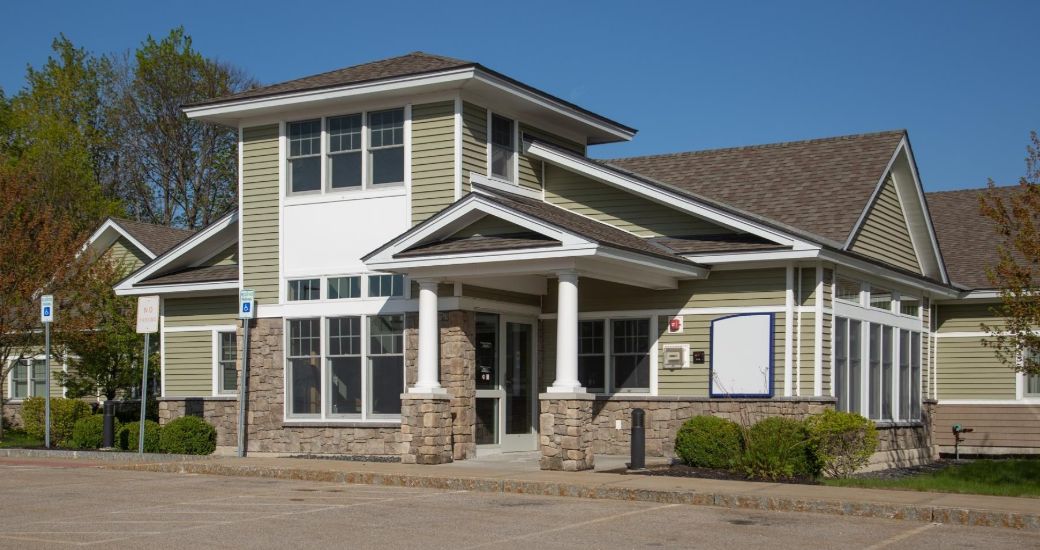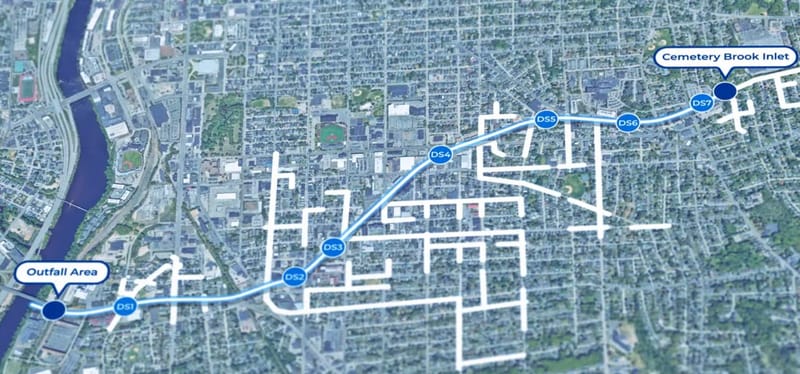Dismas Home plans to open congregant care center in Rochester
Dismas Home of New Hampshire plans to open a congregant care center for women in Rochester after a similar plan in Manchester was met with ferocious opposition from abutters last year.

MANCHESTER, NH – Dismas Home of New Hampshire plans to open a congregant care center for women in Rochester after a similar plan in Manchester was met with ferocious opposition from abutters last year.
The 13-bed center transitional home for women who have completed Dismas Home’s 90-day program at its West Side center is planned for 245 Rochester Hill Road in Rochester. A special exception application for the plan sailed through that city’s Zoning Board of Adjustment Dec. 11 in less than 15 minutes, with no questions from the board or opposition from abutters.
Dismas Home Executive Director Cheryll Andrews said details are being ironed out. The proposal will go before the Rochester Planning Board for change of use or minor site plan approval soon. If all goes as planned, Dismas Home will likely close on the property within 30 days and they hope to have the building occupied by late summer or early fall.
A 20-bed congregant care center was originally proposed for 571 Holt Ave. in Manchester. Abutters and other city residents attacked the plan at a three-plus hour January 2024 ZBA hearing. The plan was approved, but abutters continued to file appeals.
“We needed to let it go,” Andrews told Ink Link. She said the plan has been “welcomed with open arms” in Rochester.
The care center would be in a building that formerly housed a pediatric medical center. It’s owned by HCA Healthcare, and was part of the Frisbie Memorial Hospital system before the Tennessee-based health care system bought Frisbie and its assets in 2020. HCA has consolidated many Frisbie services and is selling property across Strafford County.
The 7,646-square-foot building, completed in 2013, was on the market for nearly two years before Dismas Home entered into an agreement last fall, according to real estate records.
Andrews said the building is “really beautiful,” and will require less interior renovation than the former Daniel Webster Council headquarters on Holt Avenue would have. The exam rooms will become bedrooms, and building’s exterior won’t be changed.
The location, too, is convenient. The residents will be job-hunting and learning life skills, and the building is less than half a mile from a Coast bus stop. It’s adjacent to the 185-acre William Champlin Forest conservation area.
The service the home will provide is vital for women who are on the road to recovery, Andrews said.
“Residential treatment programs like Dismas Home are limited in New Hampshire,” she said. “And in our experience the ‘magic’ happens when residents are completely supported 24 hours a day for the nine months of the program. We give them the opportunity to focus 100% on healing trauma, learning to live in recovery from addiction and building life skills. Our goal is to help women build a strong foundation for a successful life in the community.”
The project is supported by a 2024 Community Finance Development Association tax credit grant. The CFDA program allows businesses to offset their tax burden to the state by donating to nonprofit that have been awarded grants. A bill that’s making its way through the Legislature this year would raise the cap on the total amount of grant awards from $5 million to $10 million. The bill, recommended as ought to pass, was referred Thursday from the Senate floor to the Finance Committee.
Andrews said the CFDA tax credit program is a great way for businesses to offset their taxes while helping to spur economic development in their community.
Dismas Home was awarded $122,500 for the fiscal year that ends June 30, and another $300,000 for the 2025-26 fiscal year. The nonprofit is in the fundraising process to achieve those amounts, hoping that businesses that want to offset business taxes will find it a good fit.
Other funding for the expansion has come through an Opioid Abatement Trust Grant, funded through an up-to $310 million in settlements with opioid manufacturers, distributors and retailers that contributed to the widespread use of highly addictive opioid medications in the state.
A special exception was needed in Rochester for a residential use to go in a commercial/office zone. The special exception differs from a variance in that the use is allowed, but must be approved by the board, which determines if it is an appropriate location, not detrimental to the neighborhood, doesn’t create undue traffic hazards, has adequate public facilities, and is consistent with the spirit of the zoning ordinance and the Master Plan.
“This is a very unique and perfect location for this use,” Josh Lanzetta, an attorney with Burton and Berube, told the Rochester ZBA.
He said the exterior of the property won’t change, and since the 14 residents won’t have cars, and there is only a small amount of staff, it will have less of an impact on traffic and parking than a medical office would have.
“This sort of facility is needed, not only in Rochester but also greatly in New Hampshire,” Lanzetta said. “People are struggling with addiction, there are facilities like this interspersed throughout the tri-city area right now…they are very helpful to the people who are utilizing them and to their families, and that’s why the ordinance provides for this, but with a little bit of extra regulation, asking for a special permit just to check through the criteria.”
He added, “This is a really good use for the community. It provides jobs, and it provides solace and help [for the residents].”
Rochester Planning Director Seth Creighton said the plan meets criteria for a special exception, and the location is appropriate for the use. He told the ZBA that the New Hampshire Department of Transportation may want to review it because of the use change to make sure the exit and entrance curb cuts are still adequate. But, “Not an issue here,” he added.
He said one purpose of the office/commercial district is to protect wood-frame architecture with a mix of residential and low-impact nonresidential uses, and since the Dismas Home plan is residential, it meets that criteria.
A city master plan land use goal is to “meet a variety of residential opportunities throughout the city,” which the proposal does.
A specific special exception criteria for this use is it has to have 2,000 square feet of land for each bed. The property is 3.8 acres, and three-quarters of an acre would meet the requirement, “right now the proposal greatly exceeds that,” Creighton said.
The ZBA approved the application with little discussion.
“I think it’s a fine location for a special exception to go there,” member Lance Powers said.
Dismas Home of New Hampshire has operated on the West Side since 2016, founded by Julie and Jack McCarthy to address the needs of justice-involved women with co-occurring substance use disorder and mental illness. It’s the only organization in New Hampshire that provides support services to women who’ve been through the legal system, including clinical treatment, social support services while they’re residents, as well as help with finding jobs, housing and ongoing mental health support.
The name is a reference to St. Dismas, who, according to Catholic and Christian Orthodox religious tradition, was one of two men crucified with Jesus. Dismas, a thief, repented and Jesus forgave him, earning him the designation as “saint of second chances.” Dismas Homes nationwide operate independently of each other.
The congregant care home is an extension of the current residential service, providing women who have left the 90-day program, and are sober, a place to live while they improve life skills and look for jobs.
Dismas Home is licensed as a level 4 treatment program and qualifications to become a resident are “very vigorous,” Andrews told the ZBA last year. Residents are there on a voluntary basis. “No one is forced [to be a resident], no one is mandatory. They come voluntarily and are free to go when they wish,” Andrews said.
The program is for women between ages 18 and 64 whose earnings are 400% or more below the federal poverty level and are justice-involved with no violent convictions and no violent behavior during their incarceration. They must also be a minimum 30 days sober to be eligible for the program. They have a 9 p.m. curfew and are prohibited from using drugs and alcohol.
The Daniel Webster Council had been trying to sell its property at 571 Holt Ave. since 2021. Dismas Home’s proposal came in late 2023, but hit a roadblock at the contentious ZBA meeting, where opponents said they wouldn’t feel safe with the home’s residents in their neighborhood. They also cited traffic concerns.
The property was in an industrial zone, surrounded by a residential zone that has several sprawling condominium developments.
ZBA members struggled with whether to allow the center, particularly with issues of surrounding property values and the meaning of “the greater good” in the ZBA requirements for a variance. The board voted in favor of the variance, and in March voted against hearing an appeal, but opponents appealed to another city board. Cleaning business Servpro bought the property in December, with no public opposition from abutters.
Andrews said Rochester is also a good fit for the home, it’s designated as an economic growth city and there are opportunities for the women there, both for employment, and for building a life.
Andrews noted that Dismas Home founder Julie McCarthy’s dream was to have a Dismas Home in every county in the state.
If plans in Rochester proceed as expected, “Now we’ll have two,” Andrews said with a laugh.





